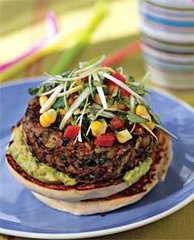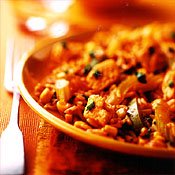My seven year old is a vegetarian. When she started her quest of avoiding meat we thought just cutting out meat itself would be enough, but it has become a journey of shocking, jaw-dropping discovery at just what contains ground-up animal parts. As a result, I am now a veggie. So I have gone from researching good recipes and nutritional information, which is essential for such a young vegetarian, to the family taking on a healthier, more compassionate outlook on life.
Tuesday, 10 April 2007
Horse meat for the high jump
Regardless of being a vegetarian or not, you have to ask yourself, where do you draw the line?
Horse meat, apparently, is slightly sweet, tender, low in fat, and high in protein, formed an important source of food for the Palaeolithic people 35,000 years ago and has been eaten ever since.
According to legend, the modern French taste for horse meat dates from the Battle of Eylau in 1807, when the surgeon-in-chief of Napolean's Grand Army, Baron Dominique-Jean Larrey, advised the starving troops to eat the flesh of horses that had died on the battlefield.
Horse meat gained widespread acceptance in French cuisine during the later years of the Second French Empire. The high cost of living in Paris prevented many working-class citizens from buying meat such as pork or beef, and in 1866 the first butcher's shop specialising in horse meat opened in eastern Paris, providing quality meat at lower prices.
Despite the general anglophile taboo, horse and donkey meat was eaten in Britain, until the 1930s.
Although people in the United States rarely eat horse meat, around 50,000 horses are slaughtered each year in one abattoir in Illinois and two in Texas for export to Europe, Mexico, or Japan. Harvard University's Harvard Faculty Club had horse meat on the menu for over one hundred years, until 1983.
(http://en.wikipedia.org/wiki/Horse_meat)
Production
In 2002, the 14 principal horse meat producing countries produced 700,000 tonnes of horse meat, with over two-thirds produced by the top six: 1 China, 2 Mexico, 3 Kazakhstan, 4 Italy, 5 Argentina, 6 Mongolia. The consumption of horse meat in Europe in 2001 was 153,000 tonnes.
A Food Standards Agency (FSA) 2003 investigation has revealed that salami sometimes contains horse meat, without this ingredient being listed. Listing is legally required.
(http://www.food.gov.uk/news/newsarchive/2003/jun/horse_meat)
I have to say, it all makes me very glad to be a vegetarian.
Horse meat, apparently, is slightly sweet, tender, low in fat, and high in protein, formed an important source of food for the Palaeolithic people 35,000 years ago and has been eaten ever since.
According to legend, the modern French taste for horse meat dates from the Battle of Eylau in 1807, when the surgeon-in-chief of Napolean's Grand Army, Baron Dominique-Jean Larrey, advised the starving troops to eat the flesh of horses that had died on the battlefield.
Horse meat gained widespread acceptance in French cuisine during the later years of the Second French Empire. The high cost of living in Paris prevented many working-class citizens from buying meat such as pork or beef, and in 1866 the first butcher's shop specialising in horse meat opened in eastern Paris, providing quality meat at lower prices.
Despite the general anglophile taboo, horse and donkey meat was eaten in Britain, until the 1930s.
Although people in the United States rarely eat horse meat, around 50,000 horses are slaughtered each year in one abattoir in Illinois and two in Texas for export to Europe, Mexico, or Japan. Harvard University's Harvard Faculty Club had horse meat on the menu for over one hundred years, until 1983.
(http://en.wikipedia.org/wiki/Horse_meat)
Production
In 2002, the 14 principal horse meat producing countries produced 700,000 tonnes of horse meat, with over two-thirds produced by the top six: 1 China, 2 Mexico, 3 Kazakhstan, 4 Italy, 5 Argentina, 6 Mongolia. The consumption of horse meat in Europe in 2001 was 153,000 tonnes.
A Food Standards Agency (FSA) 2003 investigation has revealed that salami sometimes contains horse meat, without this ingredient being listed. Listing is legally required.
(http://www.food.gov.uk/news/newsarchive/2003/jun/horse_meat)
I have to say, it all makes me very glad to be a vegetarian.
Subscribe to:
Post Comments (Atom)
































2 comments:
While I'm not a vegetarian, I have to say your blog makes me happy I don't eat salami!!!
I know! I think of all the chorizo sausage or hot-dogs I have eaten over the years, I must have eaten a whole horse in my time, doesn't bear thinking about.
Post a Comment